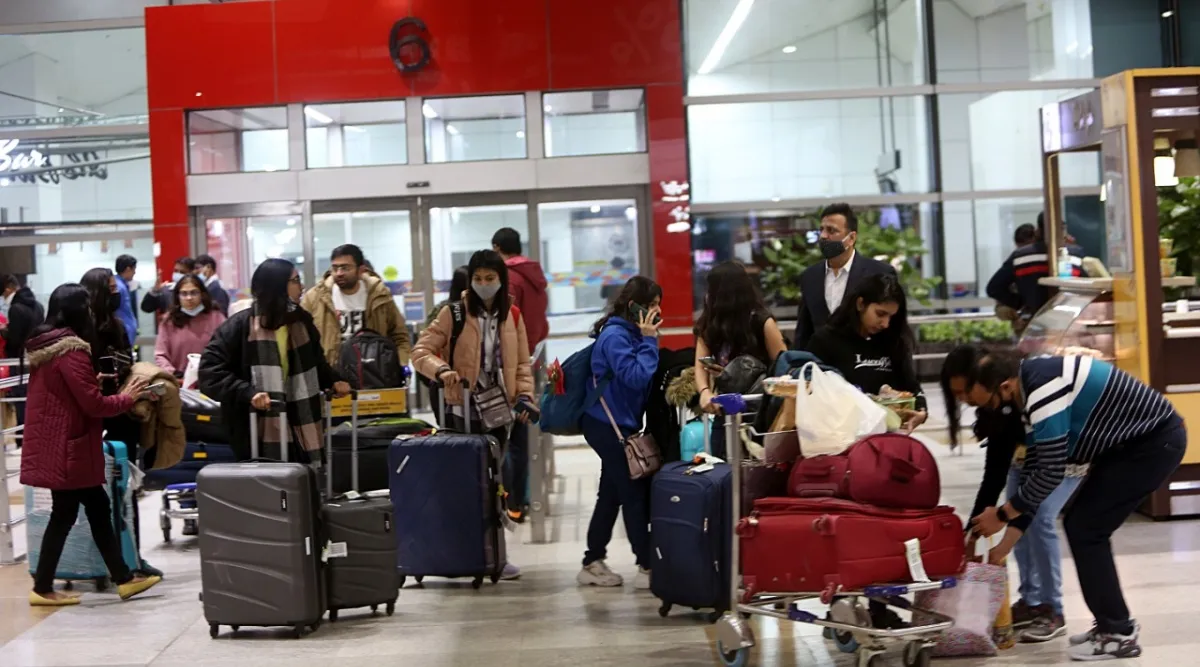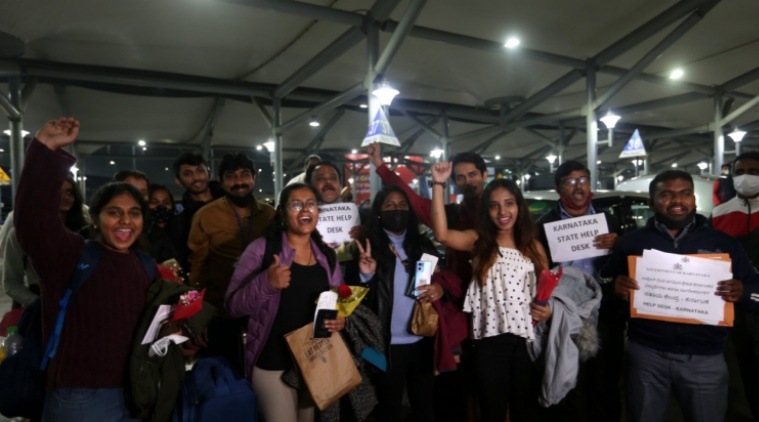 The special evacuation flight carrying Indian students studying in Ukraine reached Delhi on Sunday morning. (Express photo/ Gajendra Yadav)
The special evacuation flight carrying Indian students studying in Ukraine reached Delhi on Sunday morning. (Express photo/ Gajendra Yadav) 250 passengers, mostly from Chernivtsi in Western Ukraine, breathed a sigh of relief after they were reunited with their families back in India. A flight from Bucharest carrying them landed in Delhi at around 3 am on Sunday.
Chernivtsi is about 40 km from Ukraine’s border with Romania, said Shivam Soni, a student at the Bukovinian State Medical University. A majority of the passengers on the flight were from the same university, Soni, who is a resident of Delhi, added.
Ayna Mansoori, who is a first-year student at the same institute, while explaining their ordeal, said Chernivtsi was mostly safe. “We went to Kyiv to take the flight on February 24. However, on the way, we got an email that said that the flight would be cancelled. We waited at the Kyiv railway station for a long time, trying to get through to the Indian Embassy for help. But we had to head back to Chernivtsi, and the journey that usually takes around 8 hours, took us a day. There were traffic jams…tanks, guns, and the military everywhere in Kyiv. Residents of the city were on the roads, carrying their luggage, trying to leave,” she said.
An Air India flight was scheduled to depart from Kyiv to Delhi on February 24, but was cancelled when the Ukrainian airspace was closed for civilian flights. Students who tried to reach the airport either came back to their hostels, or were stuck in bunkers in Kyiv, said Falak Ansari, another first year-student at the university. “The university then divided us into batches, and we were sent home. Buses were arranged from the hostel to the border. At the hostel, all our luggage was stuffed into a single room, and the other rooms are being vacated for Ukrainians who might want to stay.”
 A flight from Bucharest carrying them landed in Delhi at around 3 am on Sunday. (Express/Gajendra Yadav)
A flight from Bucharest carrying them landed in Delhi at around 3 am on Sunday. (Express/Gajendra Yadav) “We have now been receiving messages from the university group saying that people are not able to cross over to Romania. There are long traffic jams all the way to the border. We had to walk around 4 to 5 km to the border, after the bus dropped us off,” Falak added.
Both Ayna and Falak are from Ahmedabad. A bus has been arranged from the Delhi airport to take them home, Falak said. Similarly, the Telangana government had also arranged a bus to take 17 students from the airport to the Telangana Bhavan. From there, a transport would be arranged for students returning to the state, an official said. At the Arrival terminal of the airport, the Haryana and UP governments, in addition to the Telangana government, had displayed banners welcoming the students, offering help and support.
Families of students paced outside the gates, waiting anxiously for their children to return home. Mahima Chawla, a second-year student of the Bukovinian State Medical University, was greeted with a hug from her father. “It was safer in Chernivtsi. There weren’t too many problems. On the way to the border, there was a lot of traffic, since many people were trying to cross over to Romania,” said Mahima, who hails from Haryana.
Shubam Dwivedi, a fourth-year student from Sidhi in Madhya Pradesh, also said that they did not face much trouble in Chernivtsi. However, he added that his friends were having a tough time in Kharkiv, on the eastern side of the country. “Chernivtsi had turned hectic and people were panicking. There were long lines at ATMs and shops,” said Gaurav Sharma, a second-year student from Delhi.
“When we heard about the situation, we stocked up on supplies. I lived in an apartment there. We gave all our supplies to the owner of the place when we left, and we parted with a hug. The Ukrainians are very scared,” Dwivedi exclaimed.
“We could see the pain on the faces of the Ukrainians. Mothers were carrying children and trying to leave. ATMs were running out of money, and most shops were closed. We were scared, and never thought that we would be in a warzone from where we would have to be evacuated,” said Chhavi Khajotia, a first-year student from Delhi. The hostel at the university has not been vacated, she said, adding that around 400 to 500 people were still there.
- The Indian Express website has been rated GREEN for its credibility and trustworthiness by Newsguard, a global service that rates news sources for their journalistic standards.

